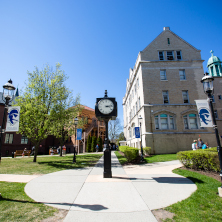Seton Hall Rises Again in US News & World Report College Ranking
Tuesday, September 15, 2020

For 2021, Seton Hall's ranking rose six places from 139 to 133 among the nation's four-year public, private and for-profit national universities.
There are 399 National Universities derived by U.S. News from The Carnegie Classification of Institutions of Higher Education's Basic Classification, with 389 schools ranked. The placement of 133 puts Seton Hall among the Top Third of all National Universities and the top 34 percent of all schools ranked for 2021.
In recent years, Seton Hall has repeatedly broken records for applications, enrollment and SAT and ACT scores as well as posting a four-year graduation rate that is 24 points higher than the last computed national average – all metrics that contribute to a school’s score in the U.S. News ranking. In addition, Seton Hall's "Peer Ranking," which measures the assessment of the University by top-level academics from other schools has again been "graded" at 3.0, steadily rising from 2.7 over the course of the last five years.
"The word is out among students and academics alike," said Senior Vice President for Enrollment Management Alyssa McCloud. "We continue to attract some of the best and brightest students and faculty in this country and throughout the world – and this is one of many recent accolades that recognizes Seton Hall as a home to what great minds can do."
The U.S. News & World Report ranking is one of many that place Seton Hall among the best colleges in the nation. Seton Hall was again recognized most recently as one of the "Top Colleges in America" by the Princeton Review; a "Best College for your Money" by Money magazine; a "College of Distinction" and a Forbes "Top College in America." The Forbes ranking was particularly compelling as it looked at alumni salary and four additional criteria—student satisfaction, debt, on-time graduation rate and academic success—in New Jersey, Seton Hall ranked higher than the esteemed New Jersey Institute of Technology.
In 2019, with an employment score of 92.55 percent, Seton Hall ranked first among all private colleges and universities in New Jersey in a ranking that used data from IPEDS and the U.S. Department of Education's "College Scorecard." Seton Hall performed better in employment for its graduates than Princeton, Rutgers (New Brunswick, Newark and Camden), Monmouth University, Stevens Institute of Technology and Drew.
"There are many rankings and Seton Hall figures prominently in all that matter," said McCloud. "The academic world is quickly catching up to what New Jersey and New York and employers and alumni have long known: Seton Hall prepares its students exceedingly well for the world."
In addition to the rise in ranking for National Universities, U.S. News again named Seton Hall to its "A-Plus Schools for B Students," and "Top Performers for Social Mobility."
U.S. News has characterized its list of "A Plus Schools for B Students," as the best national universities for students that are "trapped in the GPA of a B student" and whose "heart is set on a great college."
In "Top Performers for Social Mobility," Seton Hall scored in the top third of all national universities for the graduation rate of its Pell eligible students.
This is the second year that U.S. News has included a "Top Performers for Social Mobility" category; Seton Hall was listed as a "Top Performer" in the inaugural ranking as well. This ranking comes on the heels of a more extensive Chronicle of Higher Education ranking which placed Seton Hall among the Top 25 of all private universities in the nation for the upward financial mobility of its students, using a "mobility rate," which is "a measure of the percentage of all students in a birth cohort at a particular college whose parents were in the bottom 20 percent for household income, and who reached the top 20 percent for individual earnings." The study was based on wage and income information derived from "millions of anonymous tax records and financial-aid records."
Categories: Education, Nation and World






